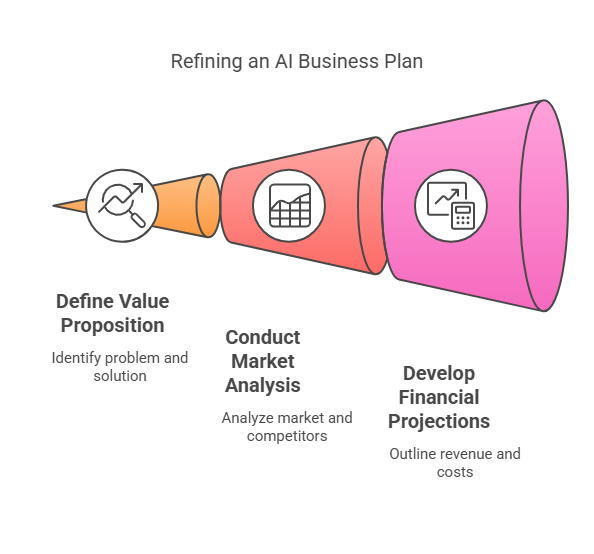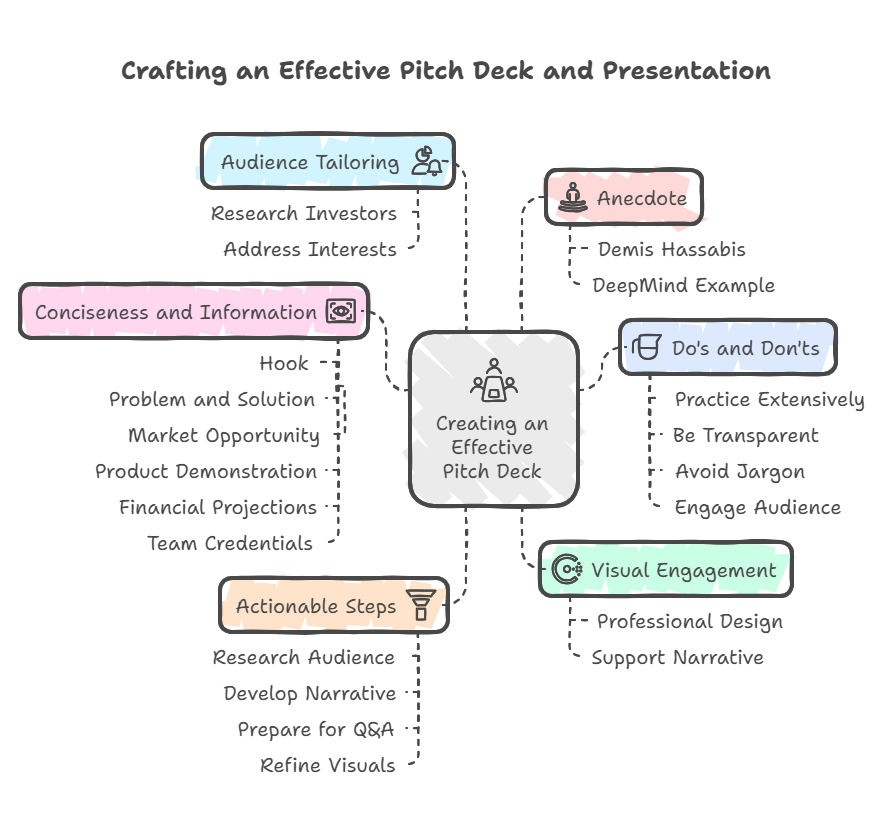Securing Funding for Your AI Business in 2025: Pitch Tips and Grants

In the fast-evolving world of artificial intelligence, finding the right funding is as challenging as training a neural network on your first try—complex, time-consuming, and sometimes a little bit unpredictable. But fret not! We’re here to share legitimate, actionable tips on how to get money for your AI venture and steer you through the labyrinth of investor pitches, grant applications, and the DIY versus agency debate. Grab your favorite cup of coffee (or energy drink), sit back, and let’s dive into the nitty-gritty of securing funding for your AI business in 2025.
Understanding the AI Funding Landscape in 2025
The AI industry is booming like never before. With technologies like machine learning, neural networks, and deep learning powering innovations from self-driving cars to personalized healthcare, investors are eager to get a slice of the action. But while the promise is huge, the funding landscape can seem daunting if you’re new to the scene.
A New Era of AI Investment
In 2025, AI isn’t just a buzzword—it’s the engine driving major shifts in nearly every industry. Investors are no longer content with vague ideas; they’re looking for well-articulated visions backed by strong execution. Think of pioneers like Demis Hassabis at DeepMind—starting from modest research to securing millions in venture capital by showing how AI can revolutionize industries. We often joke that if you’ve got a groundbreaking AI idea, investors will chase you faster than a neural network chasing 100% accuracy!
Trends Shaping AI Funding
- Government Support: Many governments are ramping up grants and non-dilutive funding to fuel AI innovation.
- Dedicated AI Venture Funds: New funds are emerging that focus exclusively on AI, looking for scalable and disruptive technologies.
- Corporate Venture Capital: Tech giants are investing heavily in AI startups to stay ahead of the curve and integrate next-gen solutions.
These trends indicate that while the funding opportunities are vast, they come with the challenge of standing out in a competitive market.
Building a Rock-Solid Business Foundation
Before you approach investors or apply for grants, your AI business needs a strong foundation. A brilliant idea without a sound plan is like an untrained model—it just won’t deliver.
Crafting a Robust Business Plan
Your business plan is your first pitch. It should cover:
- Clear Value Proposition: Define the problem your AI solution addresses and explain how it’s better than what’s already out there.
- Market Analysis: Use data-backed insights to explain your target market, competitors, and potential for growth.
- Financial Projections: Outline your revenue model, cost structure, and expected cash flows. Investors want to see that your numbers make sense.

Articulating Your Value Proposition
Your value proposition should answer, “Why should someone invest in your AI business?” Whether you’re developing an AI-powered analytics tool or an innovative customer service solution, be clear about:
- The Problem: Describe the market gap or challenge.
- Your Solution: Explain how your AI technology fills that gap.
- Benefits: Highlight advantages like efficiency gains, cost savings, or improved user experiences.
Real-World Inspiration
Take Elon Musk, for example. His early pitches weren’t just about futuristic technology; they were about solving real-world problems with a clear and actionable plan. We strive to bring that same clarity to every pitch we help shape.
Mastering the Art of the AI Investor Pitch
Your investor pitch is your moment in the spotlight—it’s where you turn vision into verifiable value. Here’s how to create an unforgettable pitch.

Creating an Effective Pitch Deck
Your pitch deck should be:
- Visually Engaging: Use clean, professional visuals to support your narrative.
- Concise and Informative: Start with a hook, then cover the problem, solution, market opportunity, product demonstration, financial projections, and team credentials.
- Tailored to Your Audience: Research your investors and tweak your presentation to address their specific interests.
Do’s and Don’ts of Pitching
- Do: Practice extensively until you can deliver your pitch confidently and naturally.
- Do: Be transparent about challenges and explain your risk mitigation strategies.
- Don’t: Overload your deck with jargon—simplicity and clarity win the day.
- Don’t: Ignore your audience. Tailor your narrative to resonate with them, much like telling a great story.
Anecdote: The Art of the Pitch
Remember when Demis Hassabis and the DeepMind team wowed investors by breaking down complex AI concepts into relatable narratives? That’s the power of a well-structured pitch. By focusing on the human side of technology, they transformed a technical idea into a story of innovation and potential.
Actionable Steps for an Unforgettable Pitch
- Research Your Audience: Know what each investor values.
- Develop a Narrative: Craft your presentation as a story with a beginning, middle, and end.
- Prepare for Q&A: Anticipate questions and have clear, concise answers ready.
- Refine Your Visuals: Invest in high-quality design to enhance credibility.
Leveraging AI Grants and Non-Dilutive Funding Opportunities
Not all funding comes from equity investments. AI grants and non-dilutive funding are fantastic options—especially for early-stage startups that want to retain full ownership.
Understanding AI Grants
Grants are funds provided by government agencies, research institutions, or private organizations. They support innovation without taking equity, making them perfect for startups focusing on R&D.
Where to Find AI Grants
- SBIR (Small Business Innovation Research) Program:
A well-established U.S. government initiative that funds early-stage tech innovations. - STTR (Small Business Technology Transfer) Program:
Focused on collaborations between startups and research institutions. - NSF (National Science Foundation):
Offers various grants supporting scientific research, including AI. - Horizon Europe:
The European Union’s flagship research and innovation program, ideal for cross-border AI projects. - Innovate UK:
For UK-based startups, this program supports disruptive technological advancements. - European Innovation Council (EIC) Accelerator:
Provides grants and equity investments for high-potential, scalable startups.
Tips for Successfully Securing a Grant
- Read the Guidelines Thoroughly: Ensure you meet all the criteria.
- Emphasize Innovation: Clearly articulate what makes your solution unique.
- Collaborate with Experts: Strengthen your proposal with academic or industry partnerships.
- Show Proof of Concept: Include data or a working prototype to prove feasibility.
- Prepare a Realistic Budget: Detail how each dollar will drive innovation.
Real-World Case: Grant Success Story
Consider a small AI startup that secured a multi-million-dollar grant from the EU by combining academic rigor with practical application in healthcare predictive analytics. Their success highlights the importance of marrying research with real-world impact.
Specific Platforms and Programs for Investors and Grants
To further simplify your funding journey, here’s a curated list of platforms and programs where you can find investors and secure grants.
Finding Investors
- AngelList (angel.co):
A go-to platform for startups seeking angel investment. Create a robust profile and connect with investors and syndicates actively looking for innovative tech ventures. - Crunchbase (crunchbase.com):
More than just a database, Crunchbase allows you to track investor activity and funding rounds, helping you target the right backers. - Gust (gust.com):
Connect with over 80,000 investors and venture capital firms worldwide. It’s an excellent place to showcase your business plan. - SeedInvest (seedinvest.com):
Ideal for equity crowdfunding, SeedInvest pairs startups with accredited investors and builds a supportive investor community. - F6S (f6s.com):
A global community that offers funding opportunities, mentorship, and access to accelerator programs for early-stage startups.
Seeking Grants
- SBIR and STTR Programs (sbir.gov & sttr.gov):
U.S. government initiatives providing non-dilutive funding for early-stage technological innovations. - NSF Funding (nsf.gov/funding):
Offers grants to support scientific research in AI, giving your project an extra layer of credibility. - Horizon Europe (ec.europa.eu/info/horizon-europe_en):
The EU’s premier funding program for research and innovation, perfect for cross-border AI projects. - Innovate UK (innovateuk.ukri.org):
Provides grants for UK startups that are driving disruptive technological advancements. - European Innovation Council (EIC) Accelerator (eic.ec.europa.eu):
Offers both grants and equity investments for high-risk, high-potential startups looking to scale.
By leveraging these specific resources, you can not only diversify your funding sources but also tap into networks that provide mentorship, strategic guidance, and connections to seasoned investors.
DIY Funding Strategies: Tools, Tech Stacks, Costs, and Timelines
For the hands-on entrepreneurs who prefer a DIY approach, securing funding might feel like juggling multiple tasks at once—like training an AI model without a pre-trained framework! Here’s what you need to know:
Essential Tools and Tech Stacks
- Presentation Software:
Tools like PowerPoint or Google Slides help you build a visually appealing pitch deck. - Financial Modeling Tools:
Use Excel, Google Sheets, or specialized SaaS like LivePlan to develop your financial projections. - Market Research Platforms:
Access platforms such as Statista, IBISWorld, or LinkedIn Sales Navigator for valuable data. - Design Software:
Canva or Adobe Creative Suite are great for creating professional-looking visuals. - Collaboration Tools:
Apps like Slack, Trello, or Asana keep your project on track and ensure smooth coordination if you’re hiring freelancers.
Cost Breakdown: DIY Approach vs. RevScaled
When you go the DIY route, be prepared for:
- Software Subscriptions:
Anywhere from $50 to $200 per month. - Freelancer Fees:
Costs could range from $500 to $3,000 per project for specialized work. - Time Investment:
Coordinating research, design, and pitch preparation could take weeks or even months.
For instance, building a complete investor pitch from scratch might involve:
- 1-2 weeks for market research,
- 2-3 weeks to develop a detailed pitch deck and financial model,
- 1 week to practice and refine your presentation,
- Totaling costs that easily add up to $2,000–$5,000 before you even sit in front of potential investors.
How RevScaled Helps You Secure Funding and Connect with Investors
If the DIY process sounds overwhelming—and let’s be honest, it can be—you might want to consider a streamlined, one-stop solution. That’s where RevScaled comes in.
What RevScaled Brings to the Table
At RevScaled, we’re not just a business growth agency—we’re your partners in navigating the complex funding landscape. Here’s how we make a difference:
- Cost and Time Savings:
Our comprehensive service starts at just $497/month for Business Development & Management. Instead of juggling multiple tools and freelancers, you get all your funding-related needs handled under one roof. - Comprehensive Services:
We offer integrated services such as:- SEO and PPC Ads: Enhance your online presence and target the right investors.
- Content Creation & Video Marketing: Bring your vision to life with engaging storytelling.
- Email Marketing & Lead Generation: Keep investors informed and engaged.
- Investor Support: We help craft compelling pitch decks, financial models, and business plans tailored to attract funding.
- Expertise and Network:
Our team has the industry know-how to connect you with potential investors, guide you through the maze of grant applications, and even assist in creating investor pitch decks that resonate. We leverage our extensive network—combining platforms like AngelList, Crunchbase, and others—to bring opportunities directly to you.
DIY vs. RevScaled: The Clear Advantage
Going DIY means investing in multiple subscriptions, spending hours coordinating with freelancers, and potentially spending thousands of dollars on piecemeal solutions. In contrast, RevScaled provides an integrated, hassle-free approach that saves you both money and precious time—so you can focus on scaling your business instead of managing logistics.
Actionable Tips and Next Steps
Now that we’ve explored the landscape and strategies for securing funding, here are some actionable steps to get you started:
- Conduct Thorough Market Research:
Utilize platforms like Crunchbase and Statista to understand market trends and identify investor interests. - Develop a Clear Value Proposition:
Define the problem your AI solution solves and how it stands out from the competition. - Craft a Comprehensive Business Plan:
Include market analysis, financial projections, and a robust strategy for growth. - Build a Captivating Pitch Deck:
Create a visual narrative using tools like PowerPoint or Google Slides. Keep it concise, clear, and tailored to your audience. - Practice, Practice, Practice:
Rehearse your pitch multiple times, seek feedback, and refine your approach. - Explore Funding Platforms:
Research investor networks like AngelList, Gust, and F6S for potential backers. - Identify Grant Opportunities:
Look into programs like SBIR, STTR, NSF, Horizon Europe, Innovate UK, and the EIC Accelerator to secure non-dilutive funding. - Weigh Your Options:
Consider whether a DIY approach or partnering with a full-service agency like RevScaled best suits your needs. - Network Actively:
Attend industry events, join online communities, and use platforms like LinkedIn to connect with investors. - Leverage Professional Support:
If funding feels overwhelming, remember that RevScaled is here to streamline your process—helping with everything from pitch deck creation to investor outreach.
FAQ
Q1: What’s the best way to start securing funding for my AI business?
A: Begin with a comprehensive business plan and deep market research. Craft a compelling value proposition, build a strong pitch deck, and explore both venture capital and grant opportunities via platforms like AngelList and SBIR.
Q2: How can I make my AI investor pitch stand out?
A: Focus on clear storytelling, use real-world examples, and support your claims with solid data. Tailor your pitch to your investor’s interests and always be prepared for a Q&A session.
Q3: Are there specific grants available for AI startups?
A: Yes. Programs such as SBIR, STTR, NSF funding, Horizon Europe, Innovate UK, and the EIC Accelerator are excellent sources of non-dilutive funding specifically geared toward innovative AI projects.
Q4: What platforms should I use to connect with potential investors?
A: Platforms like AngelList, Crunchbase, Gust, SeedInvest, and F6S are great starting points. They allow you to showcase your startup, network with investors, and even join syndicates that can boost your funding chances.
Q5: How does the DIY approach compare with using an agency like RevScaled?
A: The DIY route often involves multiple subscriptions, freelancers, and a significant time investment—costing you anywhere from $2,000 to $5,000 before you pitch. RevScaled, starting at just $497/month, offers a comprehensive solution that integrates all these elements, saving you both money and time.
Q6: How does RevScaled help in the investor outreach process?
A: RevScaled not only helps you craft a compelling pitch deck and business plan, but it also leverages its extensive network and expertise to connect you with the right investors. We streamline the entire funding process—from strategy to execution—so you can focus on growing your business.
Sources
- Investopedia: Venture Capital
- Forbes: How to Pitch to Investors
- TechCrunch: AI Startups and Investment Trends
- European Commission: Horizon Europe
- NSF: Funding Opportunities
Video source :
Final Thoughts
Securing funding for your AI business in 2025 might seem like a daunting task, but with the right strategies, clear planning, and the use of powerful platforms, you can transform challenges into opportunities. Whether you decide to take the DIY route—juggling multiple tools, freelancers, and time-consuming tasks—or partner with a seasoned agency like RevScaled, remember that a solid plan, compelling pitch, and strategic use of investor and grant platforms are your keys to success.
At RevScaled, we’ve seen firsthand how a well-executed strategy opens doors to significant funding opportunities. Our comprehensive services not only streamline your funding process but also save you time and money, ensuring you’re focused on what really matters: scaling your AI business to new heights.
Happy pitching, and here’s to your next big breakthrough in AI innovation!
RevScaled – We take the hassle out of business growth so you can focus on making breakthroughs. Contact us today to learn how our comprehensive services can propel your AI business to new heights.